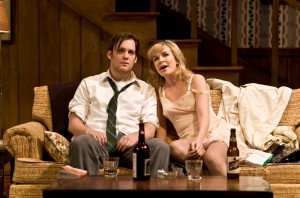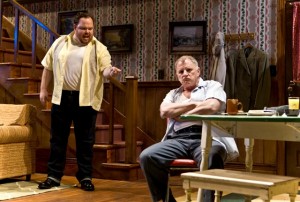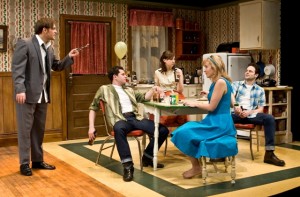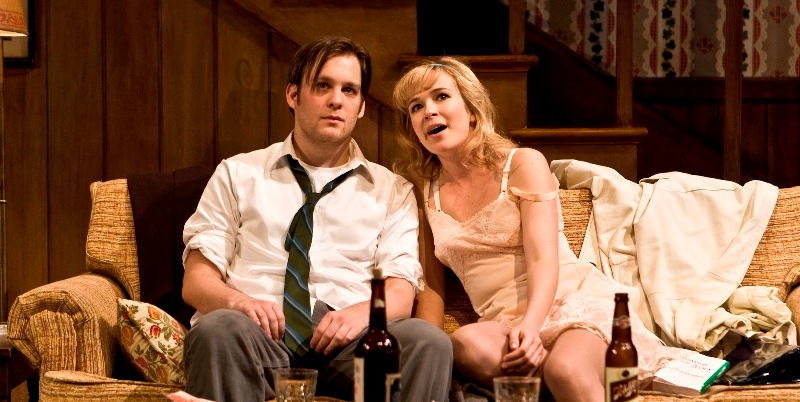
Theo Stockman and Claire van der Boom in a scene from The New Group's AN EARLY HISTORY OF FIRE. (Photo credit: Monique Carboni)
“How do you think Elvis is going to die?” ponders Danny Mueller, in that sort of living-room philosophizing that seems only, as here, to result from marrying booze, pot, youth, and friends. The principle character in David Rabe’s new play, AN EARLY HISTORY OF FIRE, set in 1962, Danny is quickly rebuffed by his irascible friend Jake who assures him that the king will not—cannot—die. For Danny, Jake, and their friends, Elvis represents the spirit of youth, the promise of freedom, and the model of happiness: “All he does is sing songs and get laid!”
The problem is that Elvis has died—rather unceremoniously—breaking any promise of the eternal spirit of youth to kids like Jake and Danny.
Had AN EARLY HISTORY OF FIRE been written in the year of its setting, it would have been a revealing and potentially dangerous play about the angst-ridden psyche of youth in the wake of The Beats and the dawning of the revolutionary sixties. Sadly, though, this play is a world premiere, first staged as the twenty-somethings of 1962 move into their seventies, and offers little in the way of new insights into the past, unexpected or enlightening corollaries to the present, or innovation to the theatrical form. As straightforward as realism comes, AN EARLY HISTORY OF FIRE gives us a drama that history has already spoiled, and leaves open the question of contemporary relevance.

Devin Ratray, Gordon Clapp in AN EARLY HISTORY OF FIRE running at Theatre Row in NYC through May 26.(Photo credit: Monique Carboni)
The play’s storyline is familiar, and well-worn. Danny is a blue-collar kid, living with his widower immigrant father in a Midwestern Anytown, yearning to “go somewhere.” He spends most of his time with Jake and Terry, best friends since early childhood, and working himself to exhaustion (presumably at a place like “the old mill”), but has recently been dating Karen, a girl from up on “Citadel Hill,” the rich part of town. Karen is home for the summer from college “out east,” having returned with a trove of artifacts alien to kids like Danny: drugs, Salinger and Kerouac, existentialism… the usual. Danny finds himself torn between his loyalty to friends and familiarity on the one hand, and the new horizons opened by Karen on the other. Violence, spite, and scandal show up in all the expected places, leaving Danny at that crossroad of the familiar and the unknown traversed by so many just like him.
Surely angst and bewilderment are timeless struggles of American youth, so it is not as though Danny is a foreign remnant from another time completely. His crisis of identity and community is one shared by countless young men and women today, if nonetheless reformulated in the vernacular of the twenty-first century. So perhaps AN EARLY HISTORY OF FIRE shows its value by reminding us that youth has always been angsty. But has anybody really forgotten that? And, if they have, are there not any number of other seminal works of art, from O’Neill through Ginsberg, John Osborne, the Ramones, and beyond that already remind us? Danny reads The Catcher in the Rye and On the Road to impress Karen, and like countless others, has his mind blown by Salinger’s Holden Caulfield, inspiring him to start pondering his place in the world vis-à-vis authority and society. These are critical experiences and questions for any burgeoning adult, but AN EARLY HISTORY OF FIRE leaves us wanting for new insight that art about the familiar often offers. As it stands, the play seems more of a museum piece than compelling contemporary drama.

Theo Stockman, Dennis Staroselsky, Erin Darke, Jonny Orsini, Claire van der Boom (front, blue dress). (Photo credit: Monique Carboni)i
The actors do the best they seemingly can with flatly drawn characters. Theo Stockman gives Danny an appropriate amount of suppressed anger tinged with perplexity, and Gordon Clapp as Pop, Danny’s father, achieves some of the play’s only moments of real pathos. Pop had fled Nazi Germany with his wife who died when Danny was ten years old, and he espouses that sort of refugee jouissance that never lets him get too down about everyday struggles. When the boil of Danny’s torment rolls its fiercest, Clapp embodies nicely Pop’s struggle to soothe his son, and his frustration with trying to impart the bigger picture to somebody who has never known real pain. Although she only appears in one long scene, Erin Darke as Shirley is a joy with her subtle scene-stealing comedy. Shirley used to date Terry, but left him and married a man who soon died in a car crash, and rumors are now surfacing the she is earning money as a prostitute. Although the same age as her friends, Shirley has lived a lifetime of experiences that allows her, like Pop, to see the humor in it all. Darke is no tumbling clown, but with her timing, flippancy, and sandwich-making technique, she becomes one of the show’s rare delights.
It seems certain throughout most of AN EARLY HISTORY OF FIRE that a twist is on the way, that something will distinguish this story from the so very familiar. But no such distinction ever emerges. Instead, Danny and his friends wrestle crises of youth, as we watch with the dramatic irony that history provides us. We know how this story ends, and AN EARLY HISTORY OF FIRE does little to complicate or enrich its conventional proverb of tormented youth.
AN EARLY HISTORY OF FIRE
Written by David Rabe
Directed by Jo Bonney
April 30 – May 26, 2012
The New Group
Theatre Row
410 W. 42nd St.
New York, NY
212-239-6200
http://www.thenewgroup.org/


